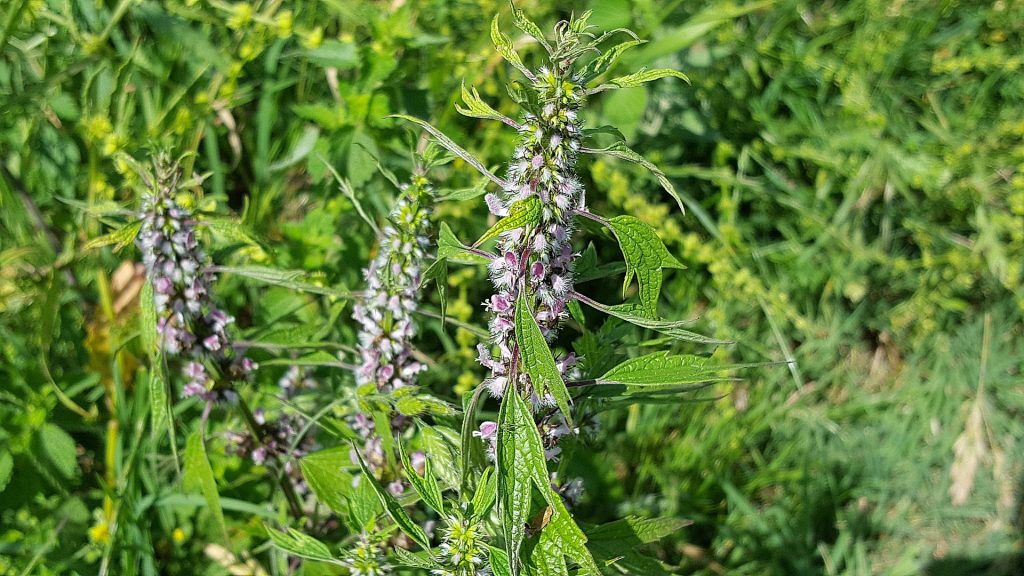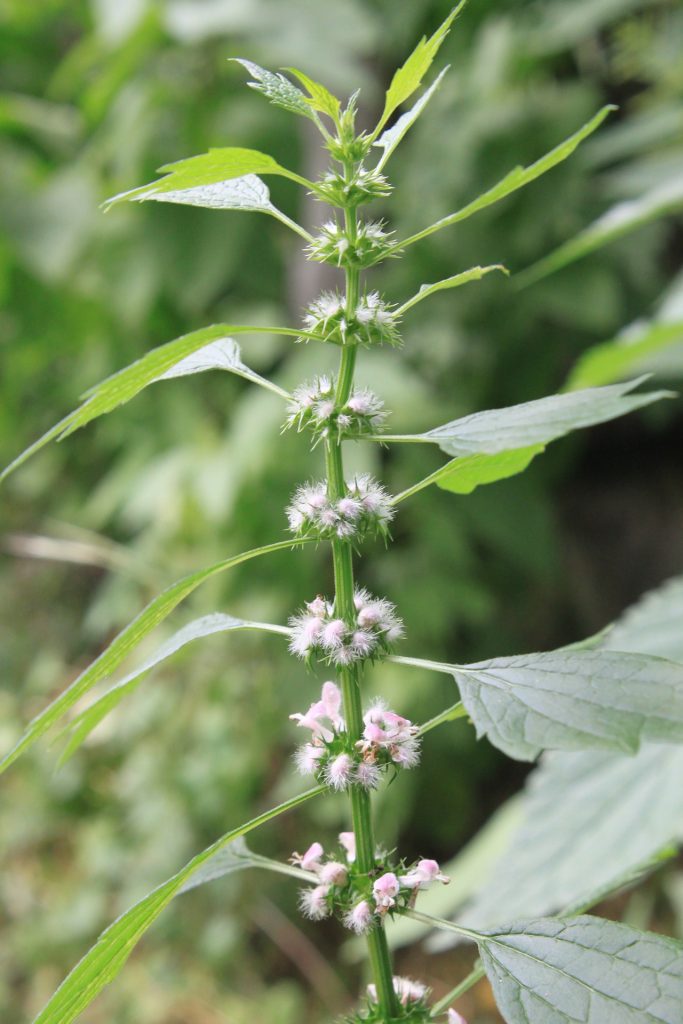 Motherwort (Leonurus cardiaca) is a perennial herb belonging to the Lamiaceae (mint) family. Motherwort is also known by a number of other common names including throw wort, lion’s ear and lion’s tail. The plant grows to about 100 cm and has distinctive three pronged leaves and purple and white flower. Motherwort was originally native to parts of Europe and Asia, but is far more widespread now due to its use as a herbal remedy. Motherwort has a number of uses in traditional medicine that have been well reported. Motherwort is known to possess antimicrobial, antioxidant, anti-inflammatory, analgesic and cardioprotective effects. In addition, motherwort is known to possess neuroprotective effects, and can also produce sedation, and in this regard may be an effective anxiolytic agent. The ability of motherwort to relieve heart palpitations may also aid those with the generalised anxiety disorder (GAD) because often with mild anxiety there are heart palpitations that can cause further anxiety in the sufferer.
Motherwort (Leonurus cardiaca) is a perennial herb belonging to the Lamiaceae (mint) family. Motherwort is also known by a number of other common names including throw wort, lion’s ear and lion’s tail. The plant grows to about 100 cm and has distinctive three pronged leaves and purple and white flower. Motherwort was originally native to parts of Europe and Asia, but is far more widespread now due to its use as a herbal remedy. Motherwort has a number of uses in traditional medicine that have been well reported. Motherwort is known to possess antimicrobial, antioxidant, anti-inflammatory, analgesic and cardioprotective effects. In addition, motherwort is known to possess neuroprotective effects, and can also produce sedation, and in this regard may be an effective anxiolytic agent. The ability of motherwort to relieve heart palpitations may also aid those with the generalised anxiety disorder (GAD) because often with mild anxiety there are heart palpitations that can cause further anxiety in the sufferer.

Detailed chemical analysis of motherwort extracts have been performed. From these investigations a number of phytochemical have been identified within the herb. Many of these phytochemicals are known antioxidants, and they may explain the significant antioxidant and neuroprotective effects of the herb. A number of chemicals belonging to the terpene group are known to be present in motherwort extracts including monoterpenes, diterpenes and triterpenes. In addition, a number alkaloids have been identified including stachydrine and leonurine. Motherwort also appears to be rich in phenolic compounds including phenylpropanoid glycosides and phenolic acids. A characteristic of plants from the mint family is their volatile oils, and motherwort contains a number of volatile oils made up of sesquiterpenes. Tannins, similar to the compounds found in black tea are also present. Motherwort also contains a number of plant sterols including β-sitosterol and stigmasterol. Plant sterols have been shown to have effects in humans by interacting with receptors for sex hormones and cholesterol.
Evidence suggests that some of the phytochemicals present in motherwort may possess neuroprotective effects. For example, the motherwort alkaloid leonurine administered to rats is able to reduce the damage caused by brain injury. The reason for this beneficial effects is thought to be due to the antioxidant effects of leonurine on the tissue, which significantly decreases the damage caused by the free radicals generated from brain injury. Reducing this generation of free radicals may in turn reduce inflammation and prevent tissue damage. The sedative effects of motherwort have also been investigated in animals. Motherwort root in combination with valerian root has been shown to be effective at sedating rabbits. When further analysis was performed its was discovered that motherwort provided the majority of the sedative effects from the herbal extract. In addition, motherwort can potentiate the sedative effects of barbiturate drugs. Aerial parts of the plant also show sedative effects in mice.
A number of studies have also been performed in humans. In one study, researchers administered a tablet containing motherwort (50 mg), valerian root (170 mg), lemon balm leaves (50 mg) and hops (50 mg) to a group of men suffering anxiety from alcohol withdrawal. The herbal combination including motherwort significantly improved sleep quality in the men. In another study, a motherwort extract in a tincture was administered to a group of subjects who were experiencing anxiety that was causing problems with colour perception. The benzodiazepine drug tofizopam and tinctures of motherwort were both effective at improving colour perception, although the effects of the benzodiazepine drug lasted longer than the herb. The similarity of the effects suggest that motherwort may act through the benzodiazepine receptor in the brain. Comparisons of the anxiolytic effects of motherwort and melatonin show both compounds to exert anxiolytic effects, but the effects may be greater with melatonin.

Flavonoids are also present in extracts of motherwort. A number of flavonoids have been shown to bind to the benzodiazepine receptor in the brain, including quercetin, kaempferol, apigenin and chrysin. The presence of flavonoids may therefore explain the sedative properties of the extracts of motherwort. Of the flavonoids present, hyperside, may be of particular interest. Hyperside is actually the flavonol quercetin, with a sugar residue attached. Quercetin has been shown to bind to the benzodiazepine receptor in the brain, and so it could be that hyperside is an important component of the sedative and anxiolytic effects of motherwort due to its structural similarities with quercetin. Motherwort is often standardised for its hyperside content (0.2 %) suggesting that it may be an important phytochemical within the plant.
Motherwort extracts may also be effective against depression. In one study involving humans, subjects were administered 1200 mg of motherwort extract per day for 10 days. The subjects all had hypertension which was accompanied by sleep disturbance and anxiety. The results of the study showed that the extracts of motherwort significantly improved the anxiety and depression experienced in 32 % of the patients treated. There was a moderate improvement in 48 % of the patients treated, and a weak effect in 8 % of the patients treated. Only 12 % of the patients failed to respond in any way to the motherwort treatment. The authors noted that although the motherwort extract was effective at improving the mood of a significant amount of the patients, there were no serious adverse side effects reported by the patients. Motherwort therefore not only appears to be an effective treatment for anxiety and depression, but also appears to be quite safe. Use of motherwort for treating mild to moderate anxiety and depression seems justified.
Eat Well, Stay Healthy, Protect Yourself
RdB
